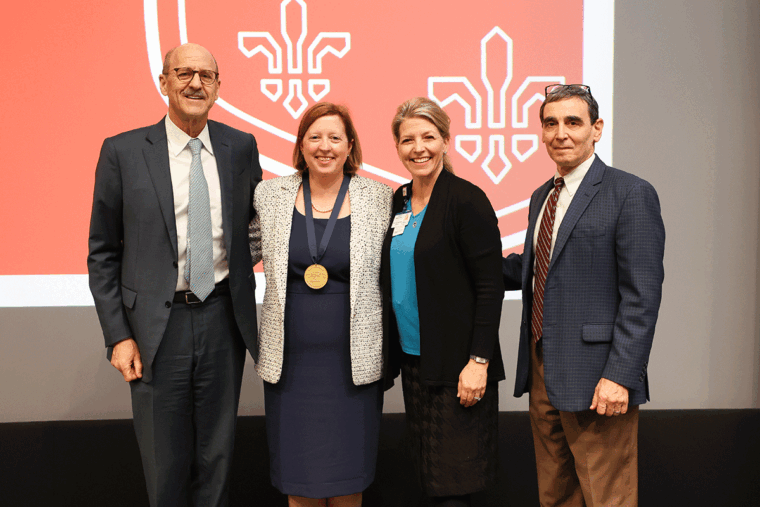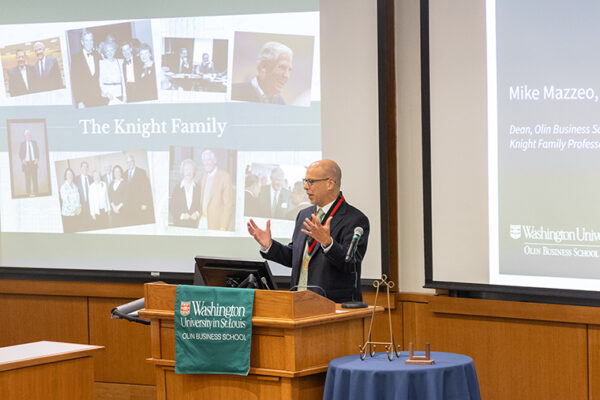Megan A. Cooper, MD, PhD, an internationally recognized physician-scientist who specializes in rare genetic diseases that affect children’s immune systems, has been named the inaugural Anthony R. French, MD, PhD, Professor in Pediatrics at Washington University School of Medicine in St. Louis. Cooper also is director of the Division of Rheumatology & Immunology in the Department of Pediatrics and treats patients with immune disorders at St. Louis Children’s Hospital.
French is the Alan L. Schwartz, PhD, MD, Professor in Pediatrics, as well as a professor of biomedical engineering and of pathology and immunology at Washington University. The professorship is funded by the St. Louis Children’s Hospital Foundation to honor French’s esteemed career and vital contributions to the fields of pediatric immunology and rheumatology.
Cooper’s research program, funded in large part by the National Institutes of Health (NIH), incorporates basic and translational studies to investigate the underlying genetic causes of rare pediatric immune deficiencies. These disorders put children at high risk of dangerous infections and other problems such as autoimmunity, inflammation and a predisposition to cancer. Her research also focuses on the metabolic regulation of natural killer (NK) cells, which are an important part of the body’s immune defenses. Normal NK cells play important roles in attacking virus-infected cells as well as cells that have become cancerous. Understanding the metabolic pathways of these cells could lead to their harnessing for the treatment of viral infections and some cancers.
“Megan Cooper is an impressive physician-scientist, an exceptional educator and a dedicated mentor,” said Gary A. Silverman, MD, PhD, the Harriet B. Spoehrer Professor and head of the Department of Pediatrics. “This professorship is meant to ensure that the curiosity, compassion and scholarship exemplified by Dr. French will continue to inspire the next generation of pediatric scientists. Megan is the model recipient: Her commitment to her patients and her continual pursuit of knowledge are inspiring.”
In recent years, Cooper and members of her lab have identified two inherited immune conditions in children, along with the genetic errors at their roots, which together provide a foundation for developing targeted therapies for these conditions. This work also has led to international collaborations identifying multiple other genetic errors of immunity and shaping additional options for future treatments.
“It is a great pleasure to recognize Dr. Cooper’s outstanding contributions to pediatric immunology with this endowed professorship named for Dr. French, whose long and distinguished career advanced this field in such important ways for our patients and their families,” said Trish Lollo, president of St. Louis Children’s Hospital.
Cooper’s research also has led to the identification and characterization of a class of natural killer cells referred to as cytokine-induced memory-like natural killer cells. A deficiency in natural killer cells — part of the body’s innate immune response — can result in uncontrolled deadly infections. In addition to fighting viruses, natural killer cells also can kill cancer cells. As such, cytokine-induced memory-like natural killer cells are now being studied as targeted therapies in clinical trials for pediatric and adult cancers.
In 2019, Cooper was recognized with the School of Medicine’s Emil Unanue Prize for Innovative Research in Immunology, and in 2023 was elected to the American Society for Clinical Investigation. She serves as an elected councilor for the Clinical Immunology Society and the Society for Pediatric Research and is an associate editor for the Journal of Clinical Immunology.
Cooper also is the scientific director of the Center for Pediatric Immunology, which recently received $5.3 million in funding from the Children’s Discovery Institute, a collaboration between the School of Medicine and St. Louis Children’s Hospital. The center’s primary goal is to provide scientific infrastructure to help investigate and create novel therapies for pediatric genetic diseases impacting immunity. In addition, she is the inaugural director of the Jeffrey Modell Diagnostic and Research Center for Primary Immunodeficiencies at St. Louis Children’s Hospital and a former associate director of Washington University’s Medical Scientist Training Program.
A distinguished researcher, clinician and mentor, French was director of the Division of Pediatric Rheumatology & Immunology from 2017-23 and was co-scientific director of the Children’s Discovery Institute. He currently serves as vice chair for physician-scientist training in the Department of Pediatrics.
French’s work is motivated by the hypothesis that a clearer understanding of the regulation of natural killer cell functional responses may lead to novel therapeutic interventions in autoimmune disorders and in host defense against large DNA viruses. He has long focused on the role of natural killer cells in initial immune responses to infection, especially the specifics of their behavior during viral infections.
French also is interested in understanding what happens when children have deficits in NK cell function, especially in the context of severe herpes virus infections. He studies the contribution of dysfunctional NK cells in triggering autoimmune diseases in children, including juvenile dermatomyositis, which causes skin rashes and muscle inflammation.
Cooper earned her bachelor’s degree from The College of Wooster and her doctorate and medical degrees from The Ohio State University. She joined the pediatric residency program at St. Louis Children’s Hospital in 2004, went on to complete a fellowship in pediatric rheumatology at Washington University and joined the faculty in 2010.
About Washington University School of Medicine
WashU Medicine is a global leader in academic medicine, including biomedical research, patient care and educational programs with 2,900 faculty. Its National Institutes of Health (NIH) research funding portfolio is the second largest among U.S. medical schools and has grown 56% in the last seven years. Together with institutional investment, WashU Medicine commits well over $1 billion annually to basic and clinical research innovation and training. Its faculty practice is consistently within the top five in the country, with more than 1,900 faculty physicians practicing at 130 locations and who are also the medical staffs of Barnes-Jewish and St. Louis Children’s hospitals of BJC HealthCare. WashU Medicine has a storied history in MD/PhD training, recently dedicated $100 million to scholarships and curriculum renewal for its medical students, and is home to top-notch training programs in every medical subspecialty as well as physical therapy, occupational therapy, and audiology and communications sciences.
Originally published on the School of Medicine website



